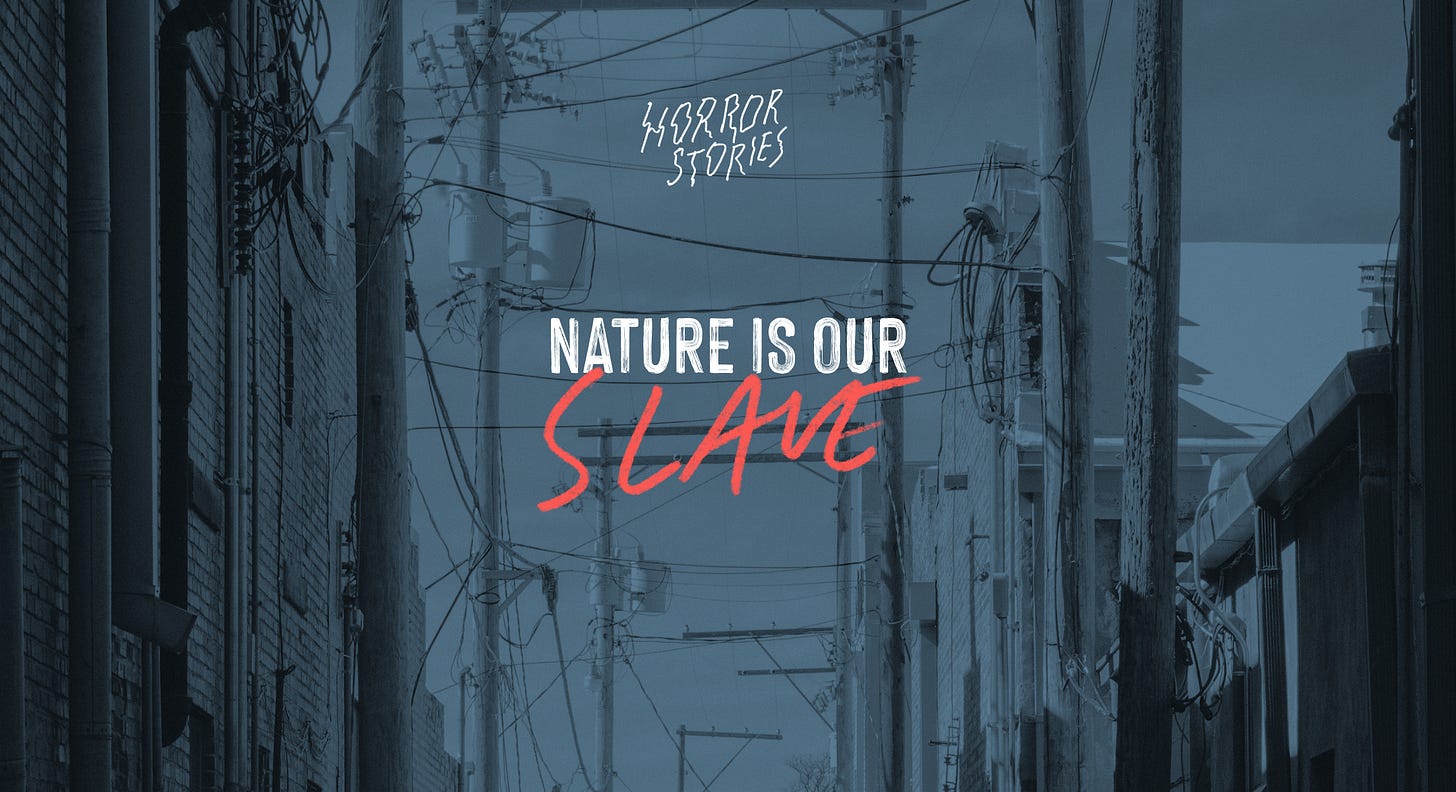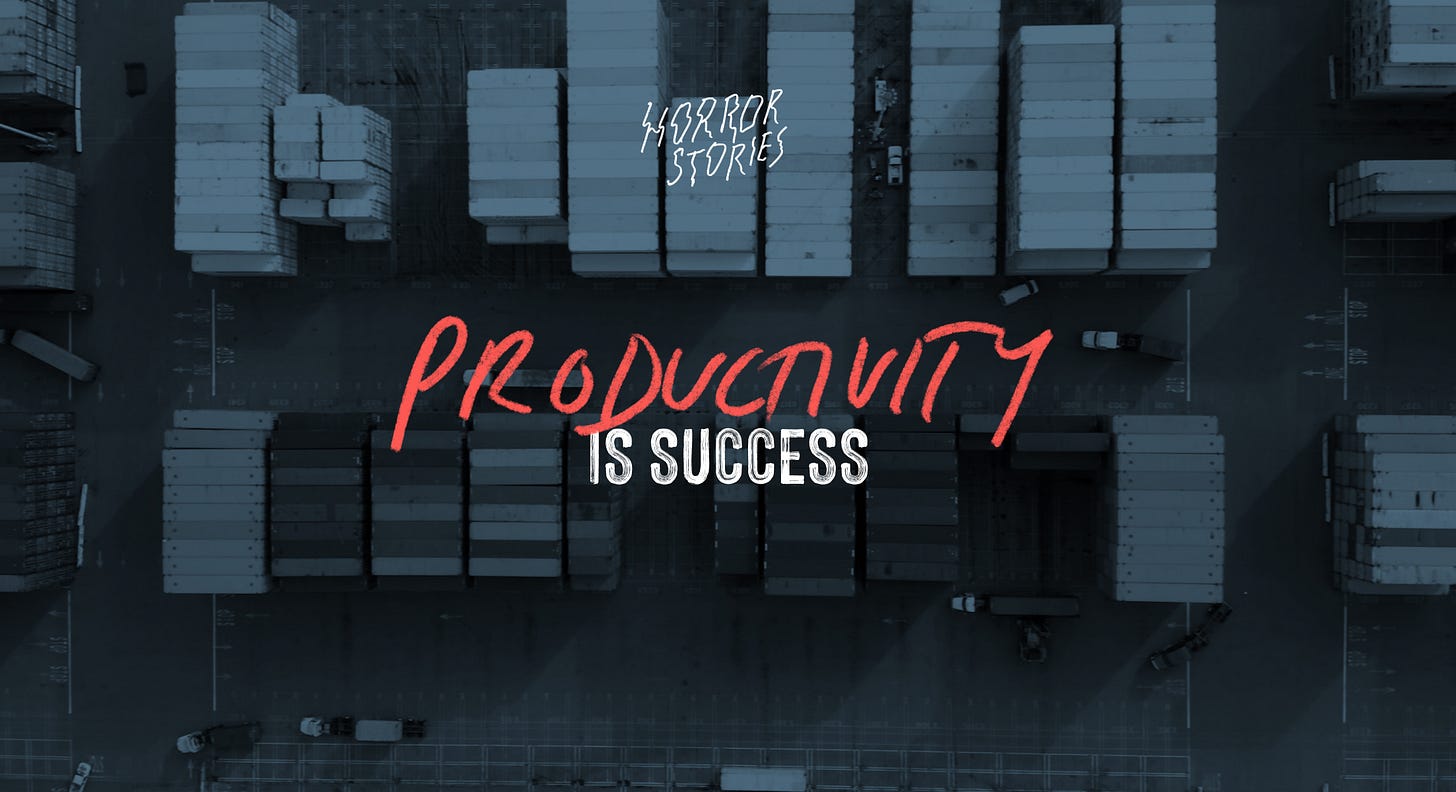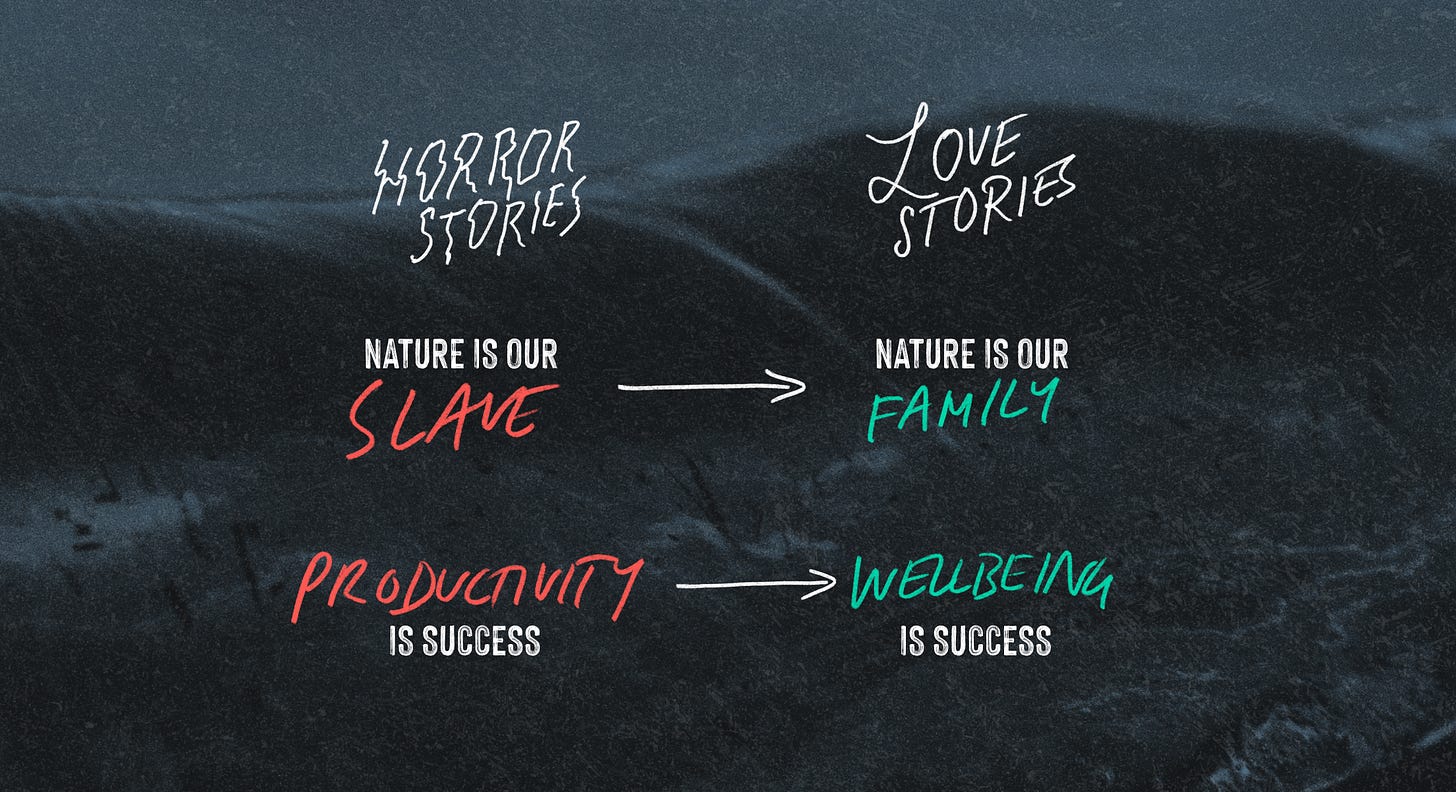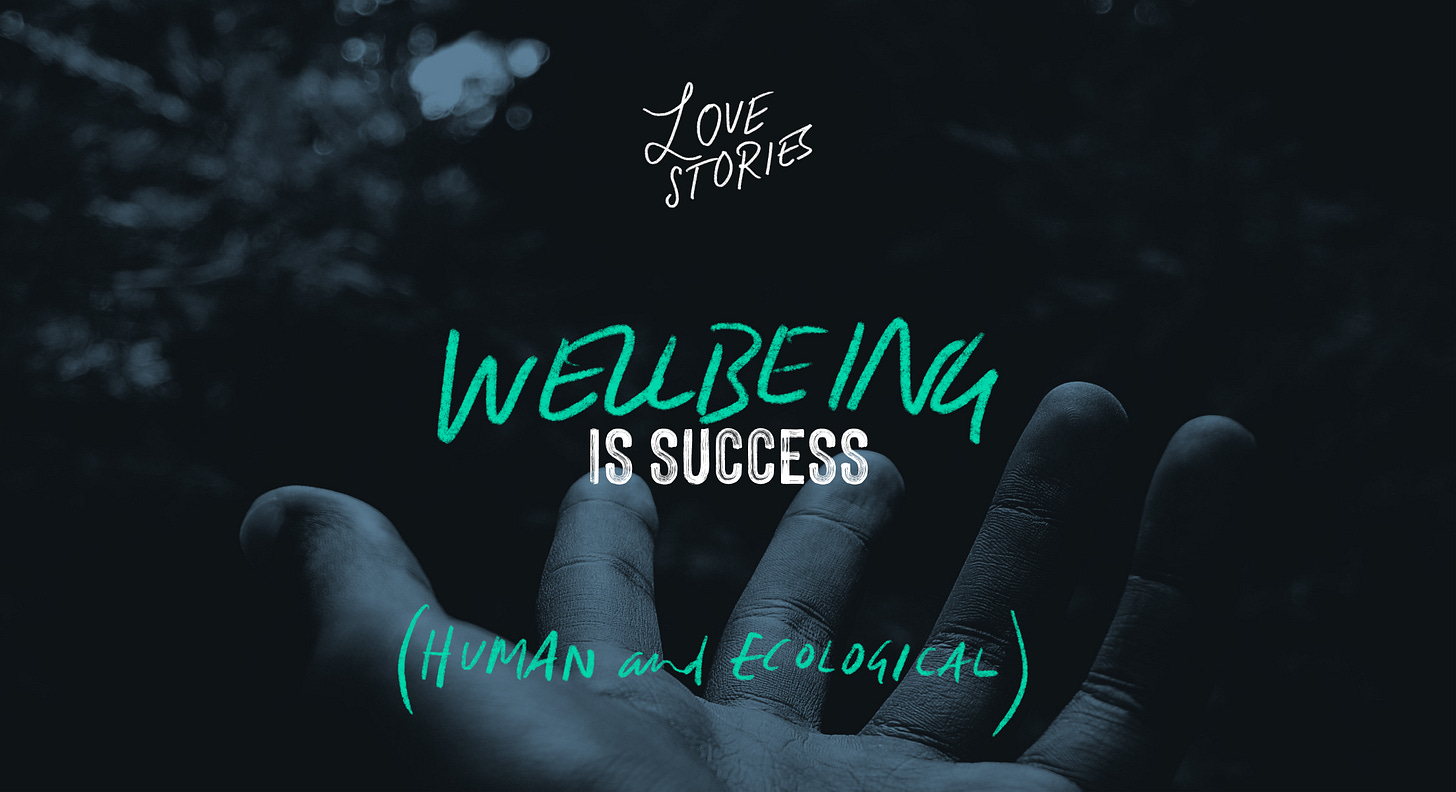Which stories do you live by?
What stories guide you through life, help you decide what is important and what matters to you ?
What stories inform where you are heading, the direction of travel that you set yourself, your family, work or wider community ?
What stories influence the choices you make everyday, the things you do ?
What stories do you go to when you think about the future?
What stories do you trust to help you make sense of the world ?
What stories are you going to in these overwhelming times ?
I find this an interesting thought experiment, I wonder what’s coming up for you ?
Because you see it turns out that stories are actually very powerful technologies.
(as my friend Ella Saltmarshe once put it)
Stories are not just frivolous entertainment, they are in fact the coding that shape what we believe, what we choose, who we are – how we think, feel and act everyday.
Stories of all kinds, in all forms.
From our myths, legends, parables and fairytales, to our textbooks, blockbusters, tag-lines and headlines, stories shape our understanding of the world and the way we act in it, so stories actually shape the world itself.
I’ve been exploring story as a form of creative activism, story activism let’s call it for some years, and intentionally since 2019 when I formed a collaboration with Green Economy Coalition and WEALL on a project which set out to try and understand what the role of story and narrative might be in helping to accelerate new economic designs which put the wellbeing of ‘all life’ at the centre.
That inquiry led to the creation and birth of Stories for Life, which weaves together the thinking and ideas of many brilliant humans, ancient and modern.
Stories for Life lays out the relationship between cultural narratives which inform how we design and organise our societies and the role that everyday stories play in weaving and maintaining those narratives.
My Stories for Life co-writer Paddy Loughman suggests thinking of a narrative like a tapestry, a whole thing which is weaved through thousands of different tiny threads of stories, which becomes the fabric of reality.
We’ve learnt that the cultural narratives and the stories that weave those narratives are the things that shape and inform the design of human systems... like economies, industries, education and political systems - that’s the way it works.
Ella frames the significance of narrative change below…
“Stories and narratives matter, the narratives we have are the soil from which the regulation, the technology, the policy, everything grows, so we need to be working at that level to effect change”
Ella Saltmarshe
Stories for life proposes that the cultural narrative that sits behind the dominant Western story of progress and informs and shapes our current economic designs is a narrative of separation - one that says we are separate from nature, the more than human world, that nature is a resource to be controlled and exploited for human progress.
The narrative has expanded over time to say we are also separate from each other, we are born as individuals who must battle it out and compete with each other to get ahead in a zero sum game of productivity.
This narrative seems to have rooted in European cultures about 500 years ago when colonialism really kicks off, blew up with the Scientific Revolution and was turbo charged by the industrial revolution.
This narrative is weaved and reinforced through the stories that we tell ourselves everyday and that we encounter in our cultures, media, politics, business and educational institutions.
Stories for Life doesn’t prescribe a single story or narrative, it’s not a silver bullet or a one size fits all top down eco solution from a bunch of white guys - we know that is not going to work anymore - and it never did work for most people and most life on this planet.
We believe that the future human systems must be co-created, be diverse, abundant with different flavours and ideas, because the monoculture of western capitalism is no longer fit for purpose, we need to accelerate decentralised ways of organising and designing these human systems, to honour place based knowledge and communities and diverse indigenous cultures.
New systems that can span and weave both ancient and modern wisdom, technologies, designs and different ways of being and knowing the world.
And this is already starting to happen all over the place despite the rotting industrial and extractive systems that still dominate, disempower and hold us back.
Everything already exists - solutions, policies, practices, tools, ways of organising, designing and building resilience and bringing life back - they are all there, tried and tested.
But Stories for Life does propose and invite a collective approach and mission:
To collectively focus on two specific stories that really drive and maintain this now destructive narrative of separation, two stories at the heart of the intersectional crises we are facing today as a species, and suggests two evolutions of those stories that might help us evolve out of this mess.
It invites storytellers, creators, those with voice and influence and anyone working with story to play with these story evolutions.
We’re asking what might happen if our collective creativity and imaginations focussed intentionally on evolving two specific deeply ingrained stories that inform our current destructive economic designs ?
Two stories that have now become horror stories, destroying the life we all depend upon and dividing us.
Horror Story 1: Nature is Our Slave
The first is the story about our relationship with nature - which we frame as ‘Nature is our Slave’ - a resource strictly for human control and progress. That might sound harsh, but look around, see how we treat and talk about the living world, observe how we treat the soils, air, insects, animals, rivers and ocean in ‘normal’ daily life.
Because of course nature isn’t a nice to have, we are utterly dependent on nature, we can’t survive without it.
For example, lets think about phytoplankton in the ocean - which alone is responsible for generating at least half of the oxygen we all breathe, and we currently subsidise its destruction with billions of pounds every year while pouring millions of gallons of shit into our rivers , polluting the very arteries of the beating blue heart of our planet. This is a horror story. You actually can’t make this stuff up anymore.
All of this destruction is shaped by stories that nature is our slave, productivity is success and a narrative that we are separate from nature.
Horror Story 2: Productivity is success
And then there is the story of how we measure success in our cultures - that story says ‘productivity alone’ is how we measure success.
Again look around, whether its how we measure our childrens success in education, how a country is doing through GDP, (a metric which measures nothing of any real value and even the inventor of it said never to use it as a success metric, it’s estimated btw that a murder adds about $1 Million to GDP ). Look as well at how business success is judged and rewarded, how we deem people as successful in culture and media.
It’s predominately through a story of productivity and accumulation of materials, financial wealth and quantitative metrics - a story of competition.
The qualities of that success are rarely considered, and the questions of ‘what is that success built on’, ‘what are the costs of that success’ are rarely asked.
For example what was destroyed and extracted for that success story, who was oppressed, what was lost, what suffered, what polluted, how have future ancestors been impacted by this success story of today?
Both these stories are intimately linked - because as we continue to measure our success by productivity and material accumulation we continue to destroy the very natural ecosystems that support all life, humans included.
We continue to grind down the human spirit in this relentless soul destroying pursuit of productivity - and breaking the connection, relationships and interdependence that is deeply entangled between humans and our more than human family.
I often think about the wild animals, insects, plants, birds, soils, water, air, stable climate - the very things that create and sustain life are dying because of stories we tell ourselves about an economy and being successful.
And the thing is it’s all interconnected, as we destroy the natural world we open up the spread of zoonotic disease like COVID 19.
As we pursue more and more growth, as ecosystems vanish and collapse, the climate changes.
We are what we do.
We are the weather.
We are nature and if we destroy nature, ultimately we destroy ourselves.
Because we are a part of nature.
Not apart from nature.
Once upon a time these stories maybe made more sense, but now they’ve become horror stories, dividing us and destroying life.
It’s time to call them out, drop them and begin to carry new stories, love stories.
Love stories that will help to weave renewed new and ancient cultural narratives of interconnection, that all life is in fact interconnected, as our leading science is now discovering and converging with ancient wisdom and what our indigenous brothers and sisters have always known - all life is interconnected, interdependent, in relationship with something else.
Love Story 1 : Nature is Our Family
What if we evolved those two destructive horror stories, so that they become Love Stories, so that we begin to see and experience nature, the more than human world as our family, ( as our indigenous brothers and sisters have always done).
Love Story 2 : Wellbeing is Success ( Human and Ecological)
And what if we began to measure our individual and collective success by the wellbeing of all life, human and ecological wellbeing.
Imagine if we began to story at scale that the collective health and wellbeing of people and planet are both intimately entangled, we cannot have one without the other, and without this shift there can be no lasting success for anyone.
Another thought experiment.
Imagine if you began to see nature, the more than human world as your extended family. You carry the story with you, that all life is sentient and alive, and let that guide you.
How would that change the way you view nature around you, how would you interact with the more than human world on a daily basis?
What about the things you buy, what you choose to eat ?
The stories that you share and tell to others?
The stories that you call out and reject ?
The things you design and create?
And what about the success metric of modern life - from productivity and accumulation to the wellbeing of all life.
Think of your overall health and wellbeing, that of your family, friends, neighbours and community and the wider living more than human world around you.
How successful would you measure life to be based on these things right now in 2022 ?
Story Activism
Story activism is powerful and accessible to everyone, because many of us have agency to decide which stories we choose to live by, what words come out of our mouths, what we share, what we create and make, what we communicate, what we celebrate, how we treat others and how we decide to show up everyday - is all informed by story.
And this all becomes new story as we embody these changes, ideas, actions and values ourselves.
We can all drop the horror stories that no longer serve us, that are destroying life and dividing us - we can call them out, reject them, refuse to give them space in our lives.
And we can all carry new love stories, share, champion, spread and embody them.
And as we do so in bigger numbers we begin to weave new cultural narratives of interconnection, and we begin to design new human systems and ways of organising ourselves on our home planet which serve life itself, all life, all people - now and way into the future.
The SpaceShip Earth podcast is one exploration and one example of a different love story
This story is grounded in the ancient and emerging narrative of interconnection - the context here is that the world is alive, a mass entanglement of intelligent and sentient life, in complex relationship and interdependence with other life.
My particular remix of this well documented story of the Earth as a Spaceship is one where the Spaceship is powered by the operating system of life itself, so here, the current crew of this spaceship, those that work to keep it thriving and flying are in fact the more than human, it is nature that creates the conditions for all life through the very practice of living itself. ( remember the plankton and plants that enable us to breathe, the soil where life emerges and all the species involved in maintaining its health)
To be crew on this Spaceship is to be in service to life.
It is to be aware of these complex relationships, interdependence and limits.
It is to be always curious for ways to bring life back to the collective whole through your own actions.
It is to put the young and vulnerable at the centre, to nurture and protect them.
It is to trust in love, emergence, intuition, experimentation, co-operation, radical diversity, not knowing and the staggering creative intelligence of life.
In this story I’m suggesting that the dominant modern human story that we have been programmed with ( in the western world/global north) and which is now unravelling at pace, is a passenger story - it encourages passivity, entitlement, disconnection, distraction, extraction, waste, greed, short-term-ism.
And this passenger story is now destroying the operating system of the Spaceship, because we are destroying the more than human crew, the vast complex web of species, ecosystems and their interdependence which in its total and unknowable wholeness creates the conditions that sustains all life.
I’m having conversations and platforming the stories of humans who are being guided by the principles of our more than human crew - instigating, convening, provoking, encouraging and inspiring change and healing across our cultures.
They live by active participation, connecting emotionally with these crises we’re facing, this existential threat to life, and to fully step into it and participate and co-create in what Joanna Macy calls ‘ The Great Turning’ — the shift from the separation story, destructive, extractive, polluting, industrialised ways of being on this earth to life-sustaining cultures, regenerative, creative, community focussed, in relationship with all life.
These stories are weaving a narrative of ‘Becoming Crew’, humans stepping into service alongside our more than human family, on board our Spaceship Earth, in service to life.
Becoming Crew on SpaceShip Earth - means stepping into service, in service to life, bringing life back to ourselves, each other and our more than human family.
Here’s a 26 minute immersive audio experience I released ‘Becoming Crew - A Story about Stories’ which explores all of this through audio if you’re interested to go deeper.
This is all story activism and anyone can become a story activist
I’m often asked by folks - what can I do in these crazy times ?
I believe we are all being asked to act - this is ACTivism.
To act on something way bigger than yourself, something you know deeply inside you is critical for life, now and way into the future.
Many people think activism is essentially glueing yourself to buildings and protesting on streets, that is a vital and effective form, but on its own and with the scale of change we are facing into - not enough.
There is so much to be acted on and that is why story activism is a space for much wider participation.
I’ve written about this before but I think this model of action from Joanna Macy is useful. I’ve circled in red where I think story activism can really focus strategically alongside more direct forms of action.
Holding Actions is essentially direct action and protest on the frontlines, halting the destruction of our ecosystems and the breakdown of climate from business as usual, so for example see here in the UK the courageous humans of XR, Fridays for Future , Stop Oil, and Black Lives Matter acting for racial and social justice and the many frontline activists around the world putting their bodies and lives on the line.
However with the overall stuckness and reluctance of governments, corporations and media to act in the meaningful way that science and society is demanding and in the time that we have, we need more non violent direct action and creative civil disobedience, more holding actions than ever before.
But we also need activism to help re-imagine and re-design the new systems that are regenerative and life-sustaining and ways to help shift cultural consciousness and perceptions - so that we consider the world in new ways, ways that serve life, all life, today and way into the future.
Imagination activism championed by the amazing Phoebe Tickell and the wider field of social and collective imagination that Cassie Robinson has been spearheading in the UK is an exciting movement and alongside this I believe sits story activism.
Because if we continue to live by these horror stories about nature as our slave and productivity alone to measure success, we will continue to destroy the very life we are all dependent on.
And we will continue to create divisive cultures based on competition, scarcity and fear, at the very time in the human story where we need to be connecting and collaborating together as a diverse human family, if we are to have a decent chance to adapt, cope and potentially flourish with the scale and complexity of the challenges coming down the line.
If we change the stories that we live by, we will change the systems that we design.
If we story a more beautiful life-sustaining world, we will co-create new human systems and ways of organising ourselves in service to life itself, on our one and only home planet.
Now and way into the future.
Join a growing community of Story Activists everywhere.
We’re currently exploring ways to fund the next phase and evolution of Stories for Life and The SpaceShip Earth podcast - progressive funders, philanthropists or folks with interest in this, please do reach out.












